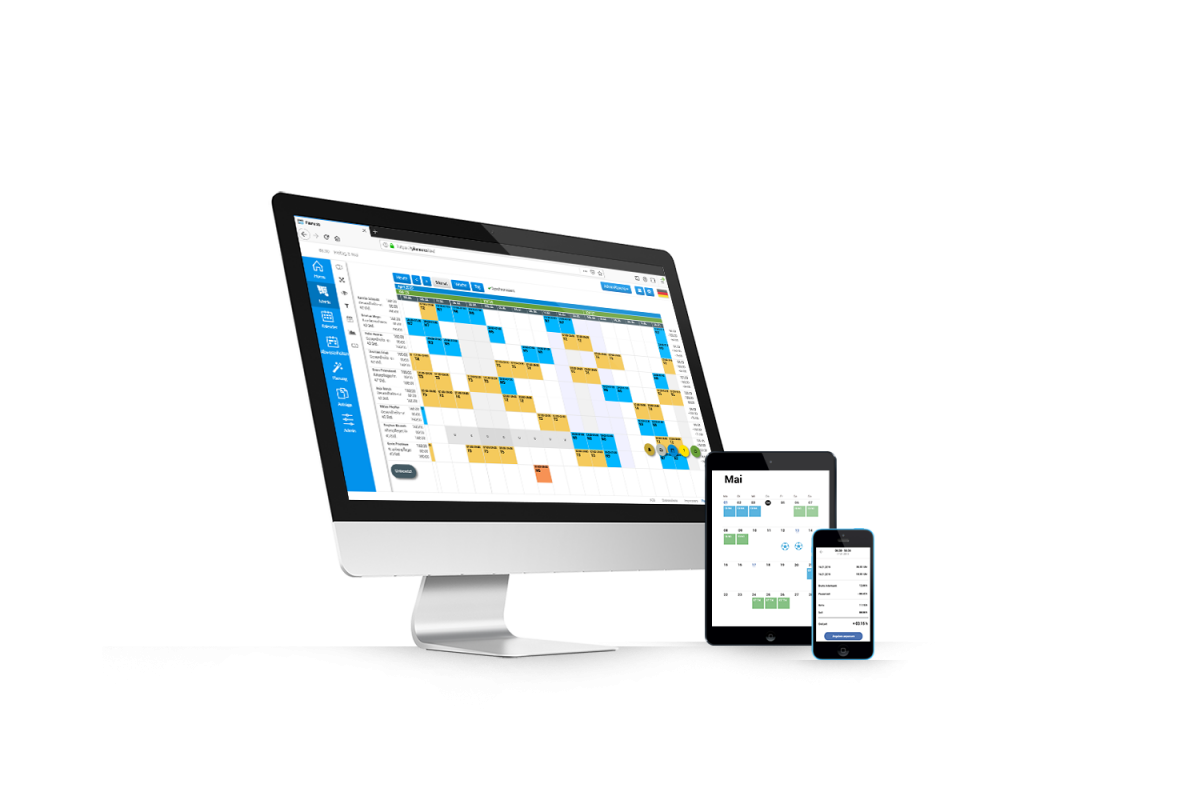Munich Startup: Who are you and what does Planerio do? Please introduce yourselves!
Markus Hinz: Stefan Klußmann (44) and I (53) are the two managing partners of Planerio, the operating system for modern workforce management in healthcare. We offer intelligent software for automated employee scheduling, time tracking and payroll accounting in hospitals, doctor’s offices and care facilities.
Stefan has his doctorate in neurobiology and, after many years at McKinsey, founded Planerio in 2016 – together with Roberto Grüter, who is also the co-founder of Brainlab, and with the ‘inventor’ of our planning algorithm, radiology professor Dr. Wieland Sommer.
I got on board this year. After twelve years as a manager at Google and with more than twenty years of experience in digitization, I was looking for a new challenge involving digital transformation – preferably in a late startup. Robert and Wieland, who I had known privately for quite some time, got me interested in Planerio and healthcare.
Dr. Stefan Klußmann: We’re particularly proud of our founding story, because it really all started in the staff room of the Klinikum Großhadern hospital. As a radiologist, Wieland Sommer had assumed responsibility for employee scheduling for his department – and was suddenly spending 25 hours a month managing scheduling requests, applications, vacations, sick days, qualifications and complaints from his team. Together with a colleague, he came up with the idea of using an algorithm to automatically generate employee schedules – and the idea for Planerio was born.
The founding idea originated in a hospital staff room
Munich Startup: What problem does your startup solve?
Markus Hinz: With our intelligent work-life management solution, we would like to provide sustained improvement in terms of staff shortage and working conditions for employees in the healthcare sector – while also contributing to enhanced patient care.
Thanks to our employee schedule and time tracking solutions, which put the focus on the needs and qualifications of employees, they can not only improve their work-life balance, but also have more time for their patients in day-to-day work.
Dr. Stefan Klußmann: Not only employees, but also management benefit from increased planning and legal certainty as well as greater work efficiency. Our intelligent, digital processes provide new scope for action and the necessary database for all forms of economic optimization (business intelligence).
AI as ‘collective intelligence’
Munich Startup: But that’s nothing out of the box!
Markus Hinz: You might think that, but there really is no other flexible, agile and automated employee scheduling of this kind based on artificial intelligence (AI) yet. And there also isn’t an employee app that has our comprehensive and employee-focused features, such as digital entry of scheduling requests, a shift exchange platform, request management and much more.
While some other providers consider copying last month’s work schedule to be ‘digitization’ or even ‘automation,’ we offer actual automated and digital generation of an employee schedule according to individually established rules. And our range of features and solutions continues to grow with each new customer. In that light, we also like to think of ‘AI’ as ‘CI’ for ‘collective intelligence.’ Our product gets a bit better every month because we’ve implemented another request from a doctor’s office, hospital or care facility.
How Planerio tackles the battle for the best talent
Munich Startup: What have been your three biggest challenges so far?
Dr. Stefan Klußmann: I would say AI was the biggest challenge – which meant writing code for an algorithm that can actually handle the complexity of all of the planning variables in healthcare (for example, legal provisions such as the regulation for minimum staffing levels) and automatically generate the optimal employee schedule for every hospital unit, care facility or doctor’s office.
A second major challenge is certainly the war for talent for us as an engineering and software startup here in Munich. The competition for the best talent is fierce. That’s why we really emphasize a corporate culture that is distinguished by mutual trust and respect, a lively exchange of knowledge and an innovative spirit. And the fact that our new technology has a real impact is motivating! With that and a strong focus on recruiting and networking, we’ve successfully built a sustainable organization.
And last but not least, there are many, long-established software solutions and IT infrastructures in healthcare. That is a major challenge for our sales team in particular. Especially when working with hospitals, you have to convince a large number of different stakeholders. But we knew what we were getting ourselves into from the very beginning: The technological shift from on-site to cloud solutions had already started long ago and was only accelerated by the corona crisis. Together with our shareholders, we have an exceptional network and expertise in the industry. That means our challenge in sales could turn into a competitive edge for us in the long run.
“Our team is growing rapidly”
Munich Startup: How is business going?
Dr. Stefan Klußmann: Planerio is already being used in more than 500 hospitals, care facilities and doctor’s offices in Germany, Austria and Switzerland. With employee scheduling in polyclinics and in more than 100 radiology departments, we’ve even become the market leader in Germany. Our team, which is just shy of 50, is also growing rapidly. The corona crisis has accelerated the process of digitization in the healthcare sector and Planerio’s success as a result. Our turnover this year just made it to the seven-digit range.
Munich Startup: What do you think about Munich as a startup location?
Markus Hinz: We value Munich as a hotspot for investors, service providers, potential customers and valuable multipliers in healthcare. And of course the high quality of recreational options it offers plays a major role for our employees. But because we’re not the only ones who see things that way, Munich’s appeal also has its downsides, such as the ‘war for talent’ that I mentioned and high rents. Nonetheless, we feel very much at home here: Munich is home to Planerio.
Good future performance thanks to quantum computing
Munich Startup: Risk or security?
Markus Hinz: I would say a healthy combination of security and calculated risk. Our customers at more than 500 locations need the security of a reliable partner to be able to plan their futures. And that’s what Planerio delivers: We’ve yet to have a customer quit using our product after they’ve tested it.
Moreover, we’re securing our innovative edge for the future with state-funded research projects. We want to use artificial intelligence to understand matters such as the demands that ‘New Work’ will make on workforce planning in two to three years in healthcare, for example in terms of flexible shift systems. And by using quantum computing, our aim is to already make sure today that our system will be able to effectively and automatically plan thousands of employee schedules at the same time in the future.






